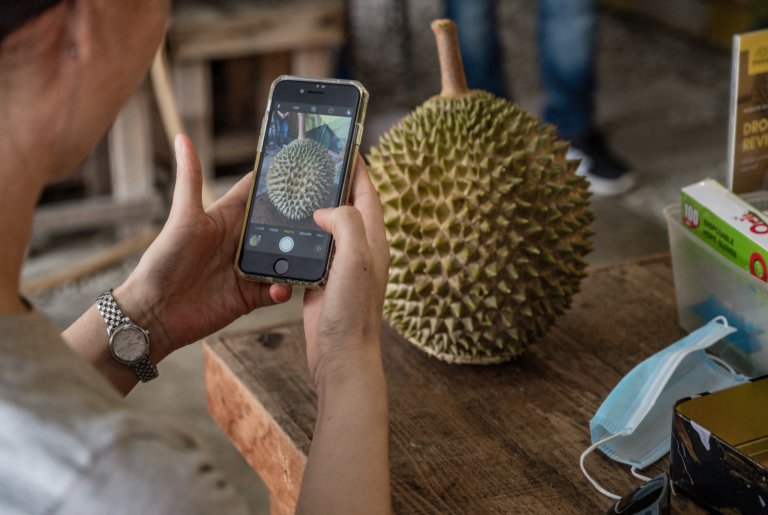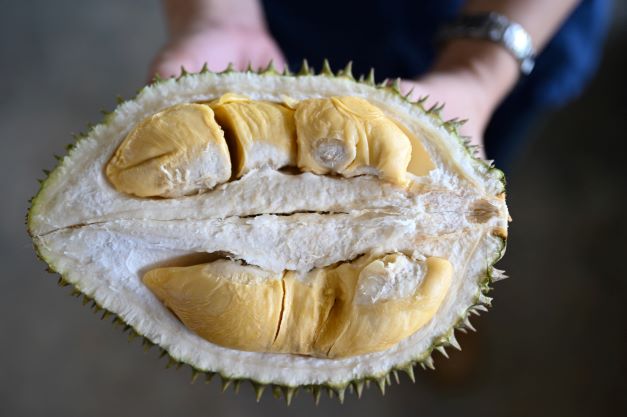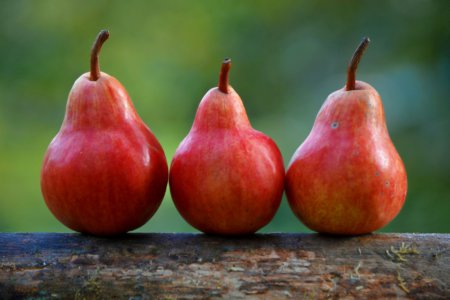
Exam season is in full swing. If you’re looking for brain food that would keep your energy levels up and improve your focus, you might want to consider eating durians.
Durians are a widely popular tropical fruit in Southeast Asia — so much so that it’s known as the “King of Fruits” in the region.
Commonly found in tropical countries such as Singapore, Thailand, Indonesia and Malaysia, the durian is distinguished by its large size and spiky green shell. Inside it, you’ll find a custard-like flesh wrapped around big seeds.
Durian is one of the most consumed fruits in Southeast Asia. According to Grab — Southeast Asia’s leading super app — Malaysians consumed over 303 million kilogrammes of durians in 2020 — or the equivalent of over 75,000 elephants!
Having said that, the fruit has gotten a lot of bad rap due to its notoriously pungent smell, which many have likened to the smell of rotten cheese. The scent is so potent that the fruit is banned in many hotels and public transport.
So what makes it so popular among those who love the fruit? Despite its pungent smell, the durian’s flesh is creamy, and can be both sweet and savoury, depending on the variant.
Plus, it’s one of the most nutritious fruits in the world, with studies suggesting that it offers numerous health benefits, from reducing cancer risks to regulating blood pressure and improving digestion, among others.
As an excellent source of nutrients, are durians good brain food? Here’s what we’ve discovered:

You’ll either love or hate the smell of durian. Source: Mohd Rasfan/AFP
Durian — the ‘brain food’ you never knew you needed?
1. Vitamin C
Eating durian gives you almost all the vitamin C you need in a day. According to DoctorPress, a cup of durian contains 80% of our daily required vitamin C intake.
Vitamin C is a powerful antioxidant that our brain and body need. According to Healthline, vitamin C plays a part in preventing mental decline. It helps to improve memory, attention, focus and decision speed.
2. Vitamin B6
Did you know that all the B vitamins benefit the brain? They lower the levels of homocysteine, an amino acid that could be linked to dementia.
Durian is rich in B vitamins, but it’s especially rich in vitamin B6 — it has 38% of the daily recommended value — which is especially important for brain health. According to HealthyEating, Vitamin B6 plays a prevalent part in brain health — regulating mood and preventing mental fatigue.
3. Magnesium
Magnesium is also found in durian. It’s an essential nutrient to support brain health as it supports learning and memory.
Healthline notes that a possible cause of neurological diseases such as migraine, depression and epilepsy is low magnesium levels.

Did you know that durian has three times more healthy fats than other fruits? Source: Tang Chhin Sothy/AFP
4. Copper
Studies suggest that you can fulfil 25% of your daily recommended copper intake with durian.
While copper is a micronutrient, it still plays a part in supporting brain health — your brain relies on it to control nerve signals.
5. Healthy fats
HealthyFocus notes that durian has high levels of nutritional fats — three times more than other fruits (except avocado).
Healthy fats — also known as good fat — can nourish your brain and help preserve cognitive function. Simply put, it helps your brain function more efficiently.
6. Potassium
Did you know that potassium is found in durian too? While the micronutrient is commonly known for regulating blood pressure, maintaining a healthy nerve function and regulating heartbeat, it also indirectly supports our brain health.
By regulating blood pressure for a smooth blood flow, the micronutrient ensures enough oxygen gets to the brain, which would pave the way for sharper focus and attention.
Ultimately, durian contains plenty of nutrients that can support our brain health. So if you ever come across an opportunity to eat the king of fruits (durian is a seasonal fruit), give it a try.









